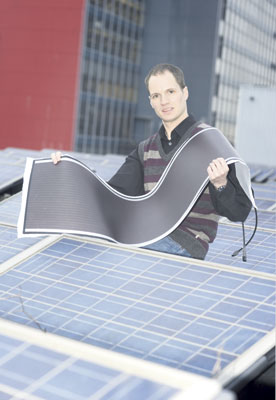I realized this very clearly when I went on an excursion to a nuclear power plant during my studies of physics at ETH Zürich. The man who gave the tour told us that in the years to come big problems concerning our energy supply would arise and that the society expects us, physicists, to solve these problems. That message stuck in my mind.
For my PhD research I work on thin film silicon solar cells. The solar cells we develop are just one and a half micrometer thick, which is much thinner than a human hair. Since they’re so thin, it costs little energy and material to produce them.
Most solar panels are made of crystalline silicon solar cells, which have a thickness of several hundred micrometers. With an efficiency varying between 15 to 20 percent, they’re about twice as powerful as thin film silicon solar cells, yet producing these cells costs huge amounts of energy.
Our section tries to improve the efficiency of the thin-film silicon cells. Each percentage point counts. This creates a very stimulating atmosphere.
My research, however, is mostly fundamental: I try to understand how the light scatters inside the cells. The cells are deposited onto carriers that are coated with transparent conductive layers. Due to this coating, rough interfaces are created. These interfaces scatter incoming light and thus increase the average photon path length in the absorber layer, leading to an increase in the absorption of light.
Light can be described as an electromagnetic field. Predicting how this field behaves inside the solar cell is very complicated and exciting. I think that in a few months I’ll complete the first version of my model, after which I can then combine this model with already existing simulation software, which my colleagues use to optimize the cells.
Until now my project is going pretty well. In 2009, I had a publication in Applied Physics Letters, which was a great moment. But I also had some set backs. One article of mine was rejected for publication. The review was very negative, although I believe the reviewer did not formulate his comments very scientifically.
I also had to undergo surgery recently, which had to do with Crohn’s disease, an inflammatory disease of the intestines that I suffer from. I have a strong will to carry on. Yes…you can write that down.”
De officiële naam van de band is The Hudson Five ft. Chris Zegers. De naam impliceert dat Zegers als zanger de hoofdattractie is. Wellicht dat de bekende Nederlander de nodige aandacht trekt, en dat de band daarom zo expliciet de naam naar voren brengt. Maar muzikaal gezien staat de band zeker zijn mannetje en hoeven ze hun faam niet te ontlenen aan de frontman. Ze spelen allemaal even goed. De lol en overgave spatten er vanaf bij optredens volgens de bandleden zelf, dus dat schept hoge verwachtingen.
The Hudson Five speelt ouderwetse rock en brengt nummers van bands als U2, Foo Fighters en AC/DC. En aangezien het niet vaak voorkomt dat deze bands in Delft optreden, is The Hudson Five helemaal geen verkeerd alternatief.
The Hudson Five ft. Chris Zegers, vrijdag 12 februari in Speakers, aanvang 20.30 uur, kaarten 10 euro. www.speakers.nl



Comments are closed.